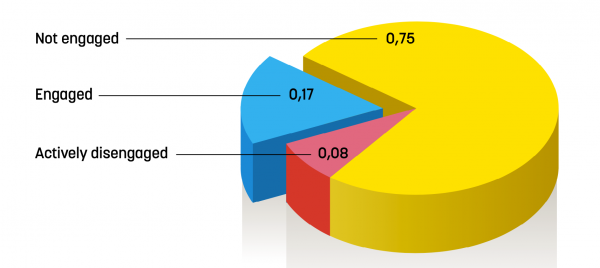Petra Andersen argues that the Weberian bureaucracy is not able to address the challenges of contemporary society and needs to be replaced by a humanocracy.
By Petra Andersen, for Forskningspolitikk
The world is turbulent and unpredictive. Many companies and organizations have difficulties keeping pace, adapt to the new landscape and to deliver innovations. In fact, most large organizations are not innovative, they are immensely bureaucratic, and very few have strong creative leaders as, say, Apple’s Steve Jobs or Amazon’s Jeff Bezos.
They were leaders who had visions that inspired their employees to do magic, as pioneering radical new business modes such as the App Store and Amazon Web Services.
Bureaucracy is a barrier for innovation
Bureaucratic structures ask more of leaders than they can deliver, and rank and titles do not help solving issues. In a bureaucracy with a few senior executives at the top, the bigger decision, the smaller the number of people who can challenge the decision maker.
Organizations therefore need to match minds with challenges, so that the one who is in charge has the competences needed to handle the problem being addressed.
How then can we unlock the hidden potential of large organizations, and create innovative organizations of the future?

Max Weber, from “Bureaucracy” in Essays in Sociology.
Too few are engaged in their work
A global Gallup study found that no more than 15 per cent of the workforce worldwide are truly engaged in their work. The other 85 per cent are showing up in person but are not bringing their passion to work.
In addition, data from Gallup show that most employees have very little control of their work lives.
Only 1 out of 5 employees thinks that her or his opinion matters at work. It is evident that many organizations waste more human capacity then they use.
Norway has the highest work engagement in Europe, according to Gallup. Yet, no more than 17 percent are involved in, enthusiastic about and committed to their work and workplace.
Many try to be more efficient by using new collaborative technology for working across silos, sharing knowledge and applying agile team methodology, but they still have the same organizations and the same power structures. By now, and in the digital age, it seems that bureaucracy has outlived its usefulness!
Developing 21st century skills
Innovation has changed the way we move, consume music, film, or pay for our shopping. We can make similar changes in the ways we manage our work. More organizations must therefore be created allowing people to do their best work, without the burden of bureaucracy and many layers of middle management.

We must unleash the genius of every employee, support the entrepreneurial spirit of organizations, and explore new management models radically different from the ones found in many existing bastions of bureaucracy.
Max Weber once said that «Bureaucracy develops the more perfectly the more it is dehumanized». It is obvious that the bureaucratic bogeyman still prevails, and that the legacy of Max Weber is alive.
However, that kind of bureaucracy was created in a completely different world where many employees were illiterate, managerial skills were rare, only those at the top had the necessary information, and change was gradual.
Gary Hamel on Bureaucracy
Power is vested in positions
Authority trickles down
Senior executives set strategy
Resources are allocated at the top
Big leaders appoint little leaders
People are slotted into roles
Managers assign tasks and assess performance
Staff functions set rules and enforce compliance
Employees compete for promotion
Compensation correlates with rank
Gary Hamel, Humanocracy 2020
We need a humanocracy
In the old management model, there was little room for the kind of creativity, intuition and curiosity that defines us as human beings. Bureaucracy is therefore a product of its time and must be replaced by humanocracy.
In many organizations bureaucracy undermines the employee’s self-motivation and entrepreneurial spirit, and create frustration to many people in their daily work. Furthermore, it undermines autonomy, resilience, and creativity, and generates massive costs in society. An OECD-study indicates that if the bureaucratic load could be cut in half, the economic output would increase by 10 trillion US$ across the OECD .
Sure, there are benefits with bureaucracy, such as the control, coordination, and consistency that we need in an organization, but the bureaucratic management must be eliminated if we are to transform organizations and society at large.
If you would like to know how you can transform your own organization into a human-centric workplace, dive into Gary Hamel and Michel Zaninis new book Humanocracy – because we need to hack bureaucracy!
Top illustration: Jorgenmac

